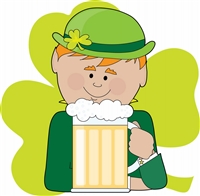Do You Know Who St. Patrick Was?

The color green, shamrocks, parades, festive dinners, and dances are ways in which St. Patrick's Day is familiar to everyone. But do you know why St. Patrick's Day is celebrated? Do you know who St. Patrick was? Read on to find out more about this very popular Irish holy day.
St. Patrick was born to a wealthy family in Roman Britain near the end of the fourth century. His parents had given him the name, Maewyn Succat. At the age of sixteen, his family's estate was attacked by a group of Irish raiders who captured him and took him to Ireland. He spent about six years in captivity, working as a shepherd. His loneliness made him turn to religion and he became a devout Christian. After six years of captivity, he heard a voice telling him that he would soon return home. This is when he escaped and returned to his family.
But since he wanted to enter the church, he went to Gaul (modern-day Western Europe) and studied under St. Germain for twelve years. He soon adopted the Christian name, Patrick. It was during his training period that he became aware of his calling. He knew that his calling was to return to Ireland and convert pagans in the country to Christianity.
He returned to Ireland as the second bishop and began his mission to convert the pagans to Christianity. In a place and time when the Celtic Druids were quite powerful in the country, Patrick managed to convert many people. The Druids did not like his influence and he was arrested many times. Each time he managed to escape with a stronger resolve to continue his mission. Little is known about the places where he actually worked. However, it is believed that he traveled throughout the country establishing monasteries, schools, and churches.
Patrick's mission continued for about thirty years. Once his mission ended, he retired to County Down. He died on March 17, 461 AD and is said to be buried at Down Cathedral in Downpatrick, County Down. The day of his death is celebrated as St. Patrick's Day. In the eighth century he became the patron saint of Ireland.
St. Patrick's Day was originally celebrated as a holy day. However, with time it has become more of a secular holiday. Although it is celebrated widely in the United States, Australia, New Zealand, and United Kingdom, it is a national holiday only in Ireland.
It was in 1737 that St. Patrick's Day was first celebrated in the United States. It was publicly celebrated in this year in Boston. However, the first St. Patrick's Day parade was only organized in the year 1762. But this parade did not take place in Ireland. In fact, it took place in New York City for the Irish soldiers serving in the English military.
Traditions associated with St. Patrick's Day include shamrocks, leprechauns, the color green, the blarney stone, and of course drinking beer. So, when you take part in a St. Patrick's Day parade this year, make sure to remember the saint, in whose honor this day is actually celebrated.
Comments (13)
There cannot have been Eastern Orthodox religion in Ireland in the fourth or fifth century AD, since the schism in Christianity whereby the Eastern Orthodox religion separated from what thereafter was to be called 'Roman Catholicism' dates from 1054.
Yet there may have been a large influence of Hebrew on early Christianity. After all Matthew's Gospel originally was written in Hebrew. Christianity only was proclaimed state religion in 395 AD. By the time of St Patrick, the use of Latin in Christianity was far from general.
This is because so much Guinness is comsumed on the 17th know one is fit for work the next day ..
Truth is different from story!
Simon Dannie
Ok no big deal.
But if they so into the past and Eire.
Why do the use Scots pipes.
And not the irish pipes.
Truth of the matter is that there was Eastern Orthodox Christianity in Ireland long before Patrick, as many pre-Roman Christian churches in the country are testimony to. What Patrick brought to Ireland was ROMAN Catholocism, and not
Christianity per-se.
The old Gaelige word for Christ is Iosa, (pronounced Eesa), and in old Hebrew, (only used in the East), the original word for Christ is Eesa. There are correlations too in our ceremonies and symbolisms in the early Christian church that only correlate with Eastern Doctrines and practices from early Christian times.
What Patrick brought to Ireland was control of the masses by Rome to bring it in line with the Christian church in England.